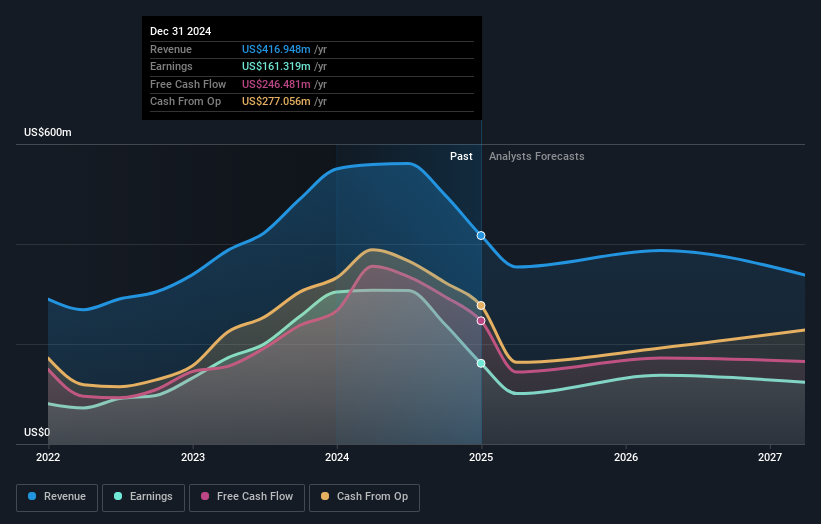
Key Insights
- Given the large stake in the stock by institutions, DorianG's stock price might be vulnerable to their trading decisions
- 51% of the business is held by the top 10 shareholders
- Insiders have been buying lately
Every investor in Dorian LPG Ltd. (NYSE:LPG) should be aware of the most powerful shareholder groups. And the group that holds the biggest piece of the pie are institutions with 70% ownership. Put another way, the group faces the maximum upside potential (or downside risk).
Institutional investors would appreciate the 6.9% increase in share price last week, given their one-year losses have totalled a disappointing 41%.
Let's delve deeper into each type of owner of DorianG, beginning with the chart below.
Check out our latest analysis for DorianG

What Does The Institutional Ownership Tell Us About DorianG?
Institutional investors commonly compare their own returns to the returns of a commonly followed index. So they generally do consider buying larger companies that are included in the relevant benchmark index.
DorianG already has institutions on the share registry. Indeed, they own a respectable stake in the company. This can indicate that the company has a certain degree of credibility in the investment community. However, it is best to be wary of relying on the supposed validation that comes with institutional investors. They too, get it wrong sometimes. If multiple institutions change their view on a stock at the same time, you could see the share price drop fast. It's therefore worth looking at DorianG's earnings history below. Of course, the future is what really matters.

Since institutional investors own more than half the issued stock, the board will likely have to pay attention to their preferences. Hedge funds don't have many shares in DorianG. Looking at our data, we can see that the largest shareholder is BlackRock, Inc. with 14% of shares outstanding. Meanwhile, the second and third largest shareholders, hold 9.6% and 6.8%, of the shares outstanding, respectively. Additionally, the company's CEO John Hadjipateras directly holds 4.7% of the total shares outstanding.
On further inspection, we found that more than half the company's shares are owned by the top 10 shareholders, suggesting that the interests of the larger shareholders are balanced out to an extent by the smaller ones.
Researching institutional ownership is a good way to gauge and filter a stock's expected performance. The same can be achieved by studying analyst sentiments. There are plenty of analysts covering the stock, so it might be worth seeing what they are forecasting, too.
Insider Ownership Of DorianG
While the precise definition of an insider can be subjective, almost everyone considers board members to be insiders. Management ultimately answers to the board. However, it is not uncommon for managers to be executive board members, especially if they are a founder or the CEO.
I generally consider insider ownership to be a good thing. However, on some occasions it makes it more difficult for other shareholders to hold the board accountable for decisions.
We can report that insiders do own shares in Dorian LPG Ltd.. It has a market capitalization of just US$927m, and insiders have US$67m worth of shares, in their own names. This shows at least some alignment. You can click here to see if those insiders have been buying or selling.
General Public Ownership
The general public, who are usually individual investors, hold a 23% stake in DorianG. While this size of ownership may not be enough to sway a policy decision in their favour, they can still make a collective impact on company policies.
Next Steps:
It's always worth thinking about the different groups who own shares in a company. But to understand DorianG better, we need to consider many other factors. Case in point: We've spotted 3 warning signs for DorianG you should be aware of, and 1 of them is significant.
But ultimately it is the future, not the past, that will determine how well the owners of this business will do. Therefore we think it advisable to take a look at this free report showing whether analysts are predicting a brighter future.
NB: Figures in this article are calculated using data from the last twelve months, which refer to the 12-month period ending on the last date of the month the financial statement is dated. This may not be consistent with full year annual report figures.
Have feedback on this article? Concerned about the content? Get in touch with us directly. Alternatively, email editorial-team (at) simplywallst.com.
This article by Simply Wall St is general in nature. We provide commentary based on historical data and analyst forecasts only using an unbiased methodology and our articles are not intended to be financial advice. It does not constitute a recommendation to buy or sell any stock, and does not take account of your objectives, or your financial situation. We aim to bring you long-term focused analysis driven by fundamental data. Note that our analysis may not factor in the latest price-sensitive company announcements or qualitative material. Simply Wall St has no position in any stocks mentioned.